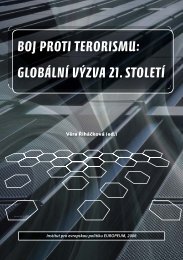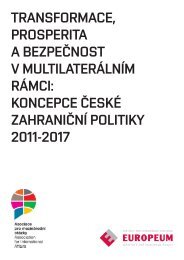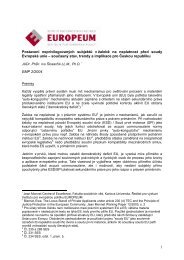eu constitutionalisation - EUROPEUM Institute for European Policy
eu constitutionalisation - EUROPEUM Institute for European Policy
eu constitutionalisation - EUROPEUM Institute for European Policy
Create successful ePaper yourself
Turn your PDF publications into a flip-book with our unique Google optimized e-Paper software.
Chapter 5: The <strong>European</strong> Constitution and the Re<strong>for</strong>m of External Competencesance with their respective constitutional requirements (Article I-41 para2). This statement is accompanied by the expansion of the Petersberg tasksreferred to in current Art 17 para 2 TEU to which other missions have beenadded in the CT.⁴⁸ They would also include “joint disarmament operations,military advice and assistance tasks, conflict prevention and post-conflictstabilisation” (Art. III-309 CT).⁴⁹ In the light of the most pertinent globalsecurity challenges, the treaty explicitly emphasises that “all these tasks maycontribute to the fight against terrorism, including by supporting third countriesin combating terrorism in their territories” (Art. III-309 CT). With a view tothese extended objectives, the requirements to provide the Union withthe necessary operational capacity <strong>for</strong> the implementation of the CSDP,increases simultaneously (Art. I-41(3) CT). The member states’ are obligedto procure such capacity, which draws on both civil and military assets, inorder to contribute to the objectives defined by the Council in relation tothe respective tasks (Art. I-41(3) and III-309(2) CT). They would, however,continue to have a right of veto with a view to their commitments in theCSDP, as <strong>European</strong> decisions on defence policy must still be adoptedunanimously (Art. I-41 (4) CT).The most relevant substantive innovations introduced in the CSDP arethreefold: the application of several mechanisms of flexibility, including thepossibility <strong>for</strong> structured cooperation, the introduction of a mutual defenceclause and lastly the establishment of a <strong>European</strong> Defence Agency.b. Areas of Flexibility in the CSDPForms of flexibility in the CSDP have many faces in the draft Constitution.On the one hand, “the Council may entrust the implementation of a task toa group of member states which are willing and have the necessary capability<strong>for</strong> such a task” (Art. III-310 CT). The participating member states, inassociation with the Union minister <strong>for</strong> Foreign Affairs, shall agree amongthemselves on the management of the task. The Council is kept regularly48) As Duke provides, “one explanation <strong>for</strong> the relatively easy expansion of the Petersberg tasks may be thatthe question of competences, at least on paper, is becoming less relevant with the prospect of an EUForeign Minister who, acting under the authority of the Council and in close and constant contact withthe Political and Security Committee “shall ensure coordination of the civilian and military aspects” of theabove tasks (Art. III-309 CT) (DUKE (2003), p.21).49) As set out in Art. I-41 para 1 CT, the Union may use its operational capacity also <strong>for</strong> missions outside theUnion <strong>for</strong> peace-keeping, conflict prevention and strengthening international security in accordance withthe principles of the United Nation Charter.166Chapter 5: The <strong>European</strong> Constitution and the Re<strong>for</strong>m of External Competencesin<strong>for</strong>med of the progress and consequences in the implementation.⁵⁰ Onthe other hand, the draft Constitution <strong>for</strong>esees a permanent structuredcooperation <strong>for</strong> “those member states whose military capability fulfil highercriteria and which have made more binding commitments to one anotherin this area with a view to the most demanding missions” (Article I-41 para6 and Article III-312 CT). This is a remarkable novelty, given that enhancedcooperation in the field of security and defence is explicitly excludedin the TEU (Art 27b TEU). Member states that wish to participate andfulfil the criteria regarding the military capabilities set out in the respectiveProtocol in the Constitution shall notify the Council.⁵¹ Within threemonths following such notification, the Council shall adopt a <strong>European</strong>decision establishing permanent structured cooperation and determiningthe list of participating member states (Art. III-312 para 2 CT). It would beopen to other member states subject to a vote by the Council of Ministerswith the participation of those member states already taking part in thegroup (Article III-312 para 2 CT). The dividing lines between these two<strong>for</strong>ms of flexibility in the CSDP are thus the qualitative requirements <strong>for</strong>military capability of the participating member states, as well as the qualityor respectively the challenges of the missions and the ad hoc character ofArt. III-310 CT. Yet, how these differences would apply in conceptual andpractical terms is not entirely clear.⁵²c. The Mutual Defence ClauseThe second major innovation in the CSDP is the mutual defence clausein Art. I-41(7) CT. Whilst it was initially, under the Convention’s draft,also designed as a <strong>for</strong>m of flexible cooperation, the final concept of theUnion’s mutual defence clause obliges all member states to aid and assist“by all the means in their power” another member state that is “the victim ofarmed aggression on its territory”, in accordance with Article 51 of the UnitedNations Charter. This comprehensive obligation constitutes a significantchallenge particularly <strong>for</strong> the n<strong>eu</strong>tral and non-aligned countries, such asAustria, Finland, Ireland and Sweden, and also Denmark with a view toits specific position in the CSDP. It, however, takes account of potential50) As Cremona observes, those member states will then be committed to the task as defined in the relevant<strong>European</strong> decision, thus they will not have complete freedom of action and if it should provide necessaryto amend those parameters, a further <strong>European</strong> decision by the whole Council of Ministers will be necessary.These provisions constitute the legal basis <strong>for</strong> such operations as in the <strong>for</strong>mer Yugoslav Republic ofMacedonia and the Democratic republic of Congo (CREMONA (2003), p.1360).51) Refer to Protocol 23 in CIG 87/04, ADD1.52) DUKE (2003), p.24.167








